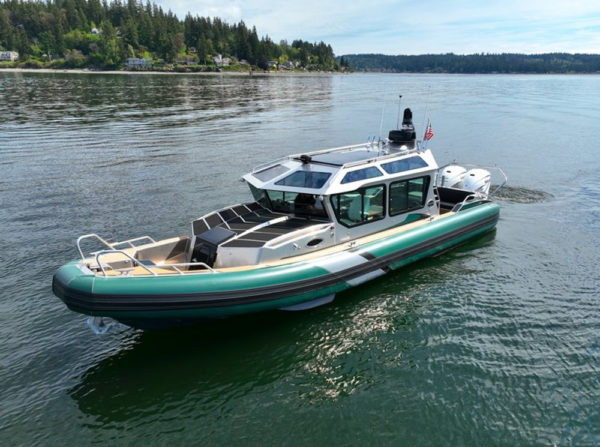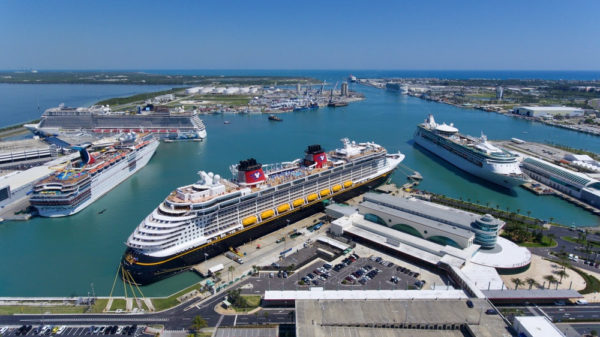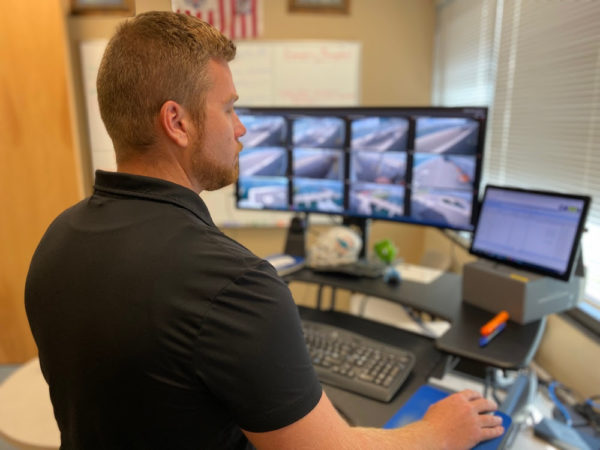FEMA Port Security Grant Program awards will enhance capabilities for threat detection and security response
The U.S. Department of Homeland Security’s (DHS) Federal Emergency Management Agency (FEMA) Port Security Grant Program (PSGP) has awarded $1,941,285 in federal grant funding for several projects at Port Canaveral to protect the Port’s critical infrastructure from terrorism and other security threats.
The Canaveral Port Authority (CPA) will receive $1,357,020 in federal funding for two projects to help bolster safety and security at Port Canaveral. The federal funding will be supplemented by a 25 percent CPA cost share match to improve the Port’s port-wide risk prevention programs, threat mitigation efforts, and security response service capabilities.

“Safety and security is a primary mission for Port Canaveral, and these awards signal great confidence in our Port from our Federal partners,” said Port CEO Capt. John Murray. “We have a critical requirement to protect and maintain our infrastructure and operations. Grants like these are important funding to help us employ new resources and latest technologies to augment our security measures with an enhanced ability to detect and respond to threats.”
The PSGP grants were awarded for two Port Canaveral security enhancements.
The Port’s Cybersecurity Vulnerability Reduction Project was awarded an $884,520 PSGP grant to support a $1.18 million project to substantially elevate and enhance Port Canaveral’s cybersecurity posture with additional information security personnel and services, resulting in a more secure and resilient Port area.
A PSGP grant for $472,500 was awarded to allow the CPA to purchase a new Security Rapid Response Boat. The vessel will be a 33-ft. “Life Proof” boat operated by Brevard County Sheriff’s Office (BCSO) and equipped with up-to-date features and technology to respond to and support current and future waterside security needs at Port Canaveral including chemical, biological, radiological, nuclear, and high yield explosives (CBRNE).
“Port Canaveral is a major economic engine for Central Florida, expanding every year, and this funding is important to assisting the Port with enhancing safety and security for passengers and cargo operations,” said Congressman Bill Posey.

custom built for the Canaveral Port Authority
The Canaveral Pilots Association was awarded $584,265 in PSGP grant funding to purchase a new response boat with high-tech, modern communication and sounding equipment to assist with emergencies and hurricane recovery operations at Port Canaveral. Supplemented by a 50 percent cost match share by the Canaveral Pilots, the grant funding will also support engine repower and technology upgrades to two existing pilot boats. The new multi-missioned vessel will be purpose-built with surveillance capabilities for rapid response to safety and security incidents, first responder transport, multi-agency response situations, and supplement a multi-layered response to Port Canaveral safety and security.
The Canaveral Pilots Association serves Port Canaveral as State and Federally licensed pilots and maintains close cooperation and coordination with the Canaveral Port Authority, the U.S. Coast Guard, the U.S. Navy, and federal and local law enforcement agencies to provide for the safe, secure, and efficient management of ship traffic in and out of Port Canaveral.

(Photo: Canaveral Port Authority)
Port Canaveral was one of over 30 U.S. ports awarded FY 2022 federal funding from FEMA’s $100 million PSGP program, which provides grants to ports on a competitive basis each year. The program’s priority is to protect critical port infrastructure, enhance maritime domain awareness, improve port-wide maritime security risk management, and maintain or re-establish maritime security mitigation protocols that support Port recovery and resiliency capabilities.
The grant is made available by DHS and administered by FEMA to strengthen infrastructure and support ports’ efforts to achieve the National Preparedness Goal established by FEMA. Since the 9/11 terrorist attacks, Port Security Grants have helped the nation’s seaports enhance measures to increase security and protect vital transportation hubs and maritime borders.











